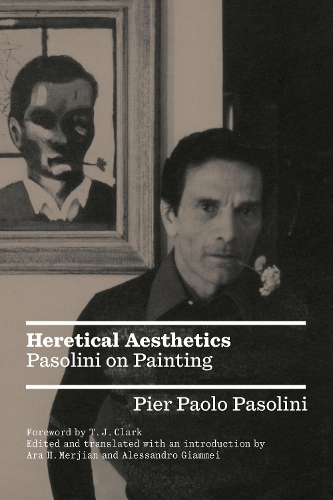
Heretical Aesthetics: Pasolini on Painting
(Paperback)
Publishing Details
Heretical Aesthetics: Pasolini on Painting
By (Author) Pier Paolo Pasolini
Edited by Ara H Merjian
Edited by Alessandro Giammei
Preface by T J Clark
Verso Books
Verso Books
3rd January 2024
United Kingdom
Classifications
General
Non Fiction
Performance art
Individual film directors, film-makers
Philosophy: aesthetics
858.91409
Physical Properties
Paperback
224
Width 140mm, Height 210mm, Spine 16mm
300g
Description
One of Europe's most mythologized Marxist intellectuals of the 20th century, Pier Paolo Pasolini was not only a poet, filmmaker, novelist, and political martyr. He was also a keen critic of painting. An intermittently practicing artist in his own right, Pasolini studied under the distinguished art historian Roberto Longhi, whose lessons marked a life-long affinity for figurative painting and its centrality to a particular cinematic sensibility. Pasolini set out wilfully to "contaminate" art criticism with semiotics, dialectology, and film theory, penning catalogue essays and exhibition reviews alongside poems, autobiographical meditations, and public lectures on painting. His fiercely idiosyncratic blend of Communism and classicism, localism and civic universalism, iconophilia and aesthetic "heresy," animated and antagonized Cold War culture like few European contemporaries. This book offers numerous texts previously available only in Italian, each accompanied by an editorial note elucidating its place in the tumultuous context of post-war Italian culture. Prefaced by the renowned art historian T.J. Clark, a historical essay on Pasolini's radical aesthetics anchors the anthology. One hundred years after his birth, Heretical Aesthetics sheds light on one of the most consequential aspects of Pasolini's intellectual life, further illuminating a vast cinematic and poetic corpus along the way.
Reviews
Vision in Pasolini is at once tactile, earthy, erotic, divine and communist. His way of seeing communes with the world rather than holding it at a distance. By bringing together his writings on art, Heretical Aesthetics gives the Anglophone reader the key to his at once singular and generous cinema and poetry. His is a perspective from elsewhere in history, one which holds our own times sternly to account. This is such a good book for understanding one of the very best of 'bad' Marxists. -- McKenzie Wark
Magisterially translated and edited, this indispensable anthology is finally available to an English-speaking audience. It provides detailed and precise insight into Pasolini's convulsive and idiosyncratic relationship with the visual arts and the artists who inspired his aesthetic sense. This exhilarating trove sheds light on the contaminated and visionary visual landscape produced by one of the most important filmmakers in the history of cinema: a total artist who found expressive depth in the heretical forms of his vision. -- Pierpaolo Antonello
Pasolini's intimate relation to painting and the history of art demonstrated in these essays is a revelation, especially for understanding his films. The texts are classic Pasolini - unfailingly brilliant and erudite, but also at once revolutionary and reactionary, observant of his times and blind to some of the most innovative developments. A fascinating collection. -- Michael Hardt, author of The Subversive Seventies
Extensively analyzed, Pasolini's cinematographic oeuvre constitutes a model of thinking the world, informed by a distinctive creative vision and his multiple interests and passions. In this unique publication, Ara H. Merjian and Alessandro Giammei provide a missing link in Pasolini's intellectual process: his deep interest in art history, and particularly painting. It is a fascinating read: Pasolini on Caravaggio, Pasolini on Warhol, Pasolini on Picasso, Pasolini on Fabio Mauri. These accomplished short essays cast a new light on his films, adding another significant layer to the work of one of the twentieth century's most prominent and fearless intellectuals. -- Alfredo Jaar
Pier Paolo Pasolini was a visionary and anti-conformist polymath: a poet, painter, essayist, social critic, film-maker, novelist, traveller, and philosopher. This anthology is the very first of its kind and fills a huge lacuna in Pasoini's studies. A crucial source for anyone interested in Italian debates over aesthetics and the cultural history of the fifties, sixties, and seventies, and a magnifying glass of post-war Europe during the Cold War. -- Angela Dalle Vacche
Author Bio
Pier Paolo Pasolini (1922-1975) was an Italian film director, poet, writer, art critic and one of the most controversial and provocative intellectuals of his time. Most well known for his first and last films, Accattone and Sal, as well as The Gospel According to St. Matthew and Decameron, he was also a prolific essayist and activist. He was murdered in 1975. Ara H. Merjian is Professor of Italian Studies at New York University, where he is an affiliate of the Institute of Fine Arts and the Department of Art History. He is the author of Giorgio de Chirico and the Metaphysical City: Nietzsche, Paris, Modernism (Yale University Press, 2014), and Against the Avant-Garde: Pier Paolo Pasolini, Contemporary Art and Neocapitalism (University of Chicago Press, 2020), which won an Andy Warhol Foundation/Creative Capital Writer's Grant. His volumes Fragments of Totality: Futurism, Fascism, and the Sculptural Avant-Garde and Blueprints and Ruins: Giorgio de Chirico and the Architectural Imagination from the Avant-Garde to Postmodernism are forthcoming from Yale University Press, and is writing the Very Short History of Futurism for Oxford University Press in 2024. He has taught at Harvard, Stanford, and the San Quentin State Penitentiary College Education Program, and is a contributing critic to Art in America and frieze. Alessandro Giammei is Assistant Professor of Italian Studies at Yale University. He is the author of Nell'officina del nonsense di Toti Scialoja (Edizioni del Verri, 2014); Una serie ininterrotta di gesti riusciti (Marsilio, 2018), and Ariosto in the Machine Age, which is forthcoming for the University of Toronto Press. He translated the epistolary between Virginia Woolf and Lytton Strachey (nottetempo, 2020, with Chiara Valerio) and Arthur Conan Doyle's The Case for Spirit Photography (Marsilio, 2022). He has taught at Bryn Mawr College, Princeton University, and in the New Jersey state penitentiary system for the Prison Teaching Initiative. He writes about art, books, and the politics of gender for the Italian newspapers il manifesto and Domani.
